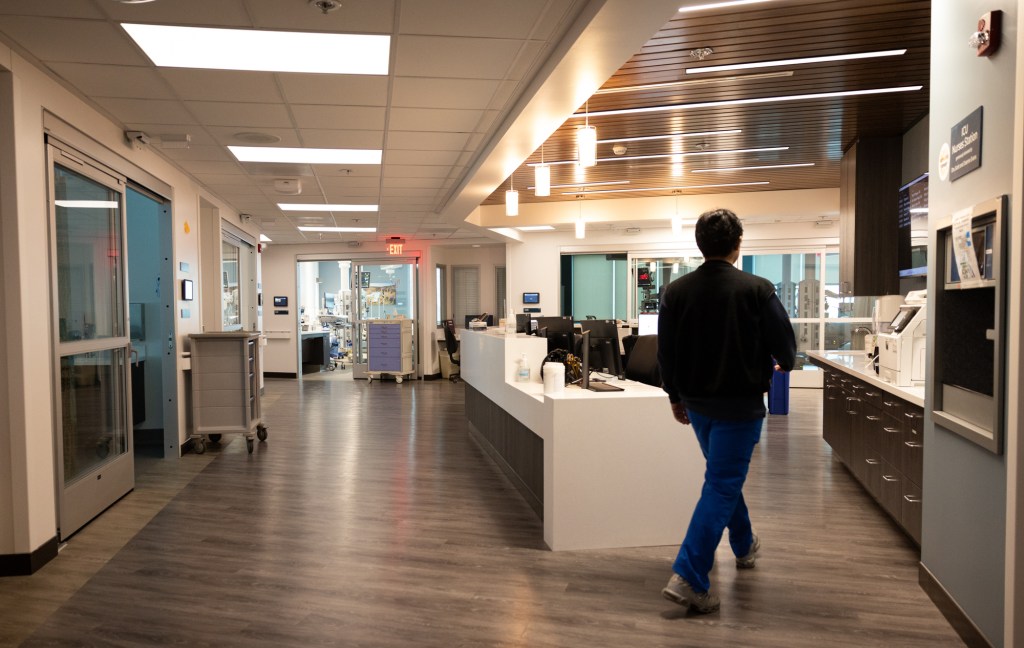Citing significant financial headwinds, Sharp HealthCare, San Diego County’s largest medical provider, on Monday announced across-the-board layoffs and pay cuts for its top executives.
Human resources notified 315 Sharp employees that their jobs had been eliminated, a number said to represent about 1.5% of the organization’s total workforce. The move comes one week after UC San Diego Health announced that it cut 230 positions for the same reasons: increased costs coupled with stagnant reimbursement and signals that Medicaid, the nation’s last-resort insurance, is likely to see significantly less support with the passage of President Donald Trump’s One Big Beautiful Bill Act.
Sharp employs 20,630 full-, part-time and per-diem workers and has about 2,800 affiliated physicians. Workers given layoff notices Monday will remain employed through Sept. 2.
Sharp said in a statement released Monday afternoon that its job cuts occurred “across all levels of the organization — including senior executive leadership — as well as reductions in hours and role adjustments for some positions.” Most positions, the company added, are in nonclinical positions and are not expected to have direct impact on patient services.
And the top executives, such as senior vice presidents, will see their compensation reduced by approximately 15%. Chris Howard, Sharp’s chief executive officer, will take a larger hit, notifying the organization’s board that his pay cut should be at least 25%. Howard’s current salary is not a matter of public record, but nonprofit “990” filings for the 2022 budget year, the most recent for which public information is available, listed his total reportable compensation at nearly $2.6 million, meaning that the top boss’s reduction could be on the order of $650,000 per year.
“That’s the responsible thing to do when you are working to rebuild the operating margin and, frankly, when we’re making extremely painful decisions such as we made today,” Howard said, adding that there are certain scenarios, which he declined to share, where his personal cut could go higher than 25%.
“I’m not even certain what the total impact will be by year-end, because we still have several months left in our fiscal year.”
Sharp’s quarterly filings to its bondholders show that it, like the majority of medical providers nationwide, is struggling to make the revenue its services generate cover the cost of providing care.
Last year, the operation made $44 million on $5.1 billion of revenue. However, earnings on about $4 billion of investments, most of that cash dedicated to future building programs, kept the balance sheet in the black. But this fiscal year, which ends in September, so far has generated a $38 million operating loss and the up-and-down stock market makes short-term investment returns less certain.
While investment income is expected to bring that number back into the black, Howard said that the organization has to do what it can to bring outgo in line with income.
“We are fortunate to have a very strong balance sheet, which provides us with the days cash on hand to weather challenging times such as these,” Howard said. “However, that’s not a long-term solution.
“One can only take money from the bank account for so long before one has to ensure that more money is coming in than is going out.”
Howard made it clear that he does not intend to halt efforts that have the potential to expand Sharp’s overall footprint in San Diego County, including a newly announced and still-in-negotiation agreement with Tri-City Medical Center in Oceanside.
“Tri-City represents profitable growth, and it’s an investment that we will make over a number of years as we make similar investments with expanded ambulatory clinics, including Sharp Rees Stealy, Sharp Community Medical Group and Sharp Health Plan,” Howard said. “These are all significant parts of our plans to continue growing in the coming years as we work to return to a more positive operating margin.”
For those who lost their jobs Monday, Sharp said that it is offering career transition support, severance packages, extended health care coverage and other resources.
But Howard said that the current situation in Washington, with significant cuts to Medicaid — called Medi-Cal in California — presents an unprecedented challenge.
“Sharp is the largest provider of Medi-Cal services in San Diego County, and any meaningful reductions to that reimbursement, be that from the federal government or the state of California, will require additional work on our part,” Howard said. “We have critical service lines such as behavioral health, which are significantly focused in Medi-Cal as well as the general patient population.”
Originally Published: June 30, 2025 at 7:41 PM PDT
